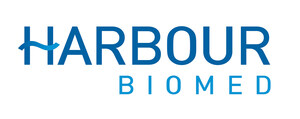CAMBRIDGE, Mass., ROTTERDAM, Netherlands and SUZHOU, China, Aug. 8, 2022 /PRNewswire/ -- Harbour BioMed (the "Company", HKEX: 02142) announced that the preclinical results of porustobart (HBM4003, or the HCAb 4003-2 in the research paper), a next-generation fully human heavy-chain antibody with a Treg depletion mechanism, were published in the Proceedings of the National Academy of Sciences (PNAS). For the last two years, the Company's scientists have published paper on top-tier journals such as Nature Communications, Science Immunology, and now PNAS.
Porustobart with a unique molecular structure shows an excellent preclinical efficacy and safety profile:
1. A fully human heavy-chain antibody (HCAb), porustobart binds human CTLA4 with high affinity reaching 10-11 M.
2. It effectively depletes tumor-resident Treg with enhanced antibody-dependent cellular cytotoxicity (ADCC).
Porustobart showed, maximally, 60% lysis of in vitro differentiated Treg cells at 1 nMol concentration. The median effective concentration of porustobart was about 100-fold more potent than the current standard antibody.
3. It shows potent tumor penetration due to its small size, resulting in a more widely effect on T cell activation.
Mice were dosed with labeled porustobart or hIgG1. Peak signal was detected at 1h in normal tissues, while it was maximal at 24h in the tumor, showing superior tumor penetration for porustobart than hIgG1.
4. Less systemic drug exposure in vivo potentially provides an improved therapeutic window in clinical applications.
In MC38-bearing human CTLA-4 knock-in (KI) C57BL/6 mice and CT26-bearing huCTLA-4 KI Balb/c mice, porustobart showed higher potency than the standard anti CTLA4 antibody.
More importantly, porustobart showed an excellent safety profile. A single dose of porustobart at 30 mg/kg was well tolerated in cynomolgus monkeys.
About PNAS
PNAS is one of the world's most-cited and comprehensive multidisciplinary scientific journals. The Proceedings of the National Academy of Sciences (PNAS), a peer-reviewed journal of the National Academy of Sciences (NAS), is an authoritative source of high-impact, original research that broadly spans the biological, physical, and social sciences.
About Porustobart (HBM4003)
Porustobart (HBM4003) is a fully human anti-CTLA-4 heavy chain antibody (HCAb) generated in Harbour Mice®. It is the first fully human heavy chain antibody entered into clinical stage globally. By enhancing antibody-dependent cell cytotoxicity (ADCC) killing activity, porustobart demonstrates significantly improved depletion of high CTLA-4 expressing Treg cells in tumor tissues. The potent anti-tumor efficacy and differentiated pharmacokinetics with durable pharmacodynamic effect present a favorable product profile. This novel and differentiated mechanism of action has the potential to improve efficacy while significantly reducing the toxicity of the drug in monotherapy and combination therapy.
About Harbour BioMed
Harbour BioMed (HKEX: 02142) is a global biopharmaceutical company committed to the discovery, development and commercialization of novel antibody therapeutics focusing on immunology and oncology. The Company is building its robust portfolio and differentiated pipeline through internal R&D capability, collaborations with co-discovery and co-development partners and select acquisitions.
The Company's proprietary antibody technology platforms, Harbour Mice® generate fully human monoclonal antibodies in two heavy and two light chain (H2L2) format, as well as two heavy chain only (HCAb) format. Building upon the HCAb antibodies, the HCAb-based immune cell engagers (HBICE®) bispecific antibody technology is capable of delivering tumor killing effects unachievable by traditional combination therapies. Integrating Harbour Mice®, HBICE® with single B cell cloning platform, our antibody discovery engine is highly unique and efficient for development of next generation therapeutic antibodies.
SOURCE Harbour BioMed

WANT YOUR COMPANY'S NEWS FEATURED ON PRNEWSWIRE.COM?
Newsrooms &
Influencers
Digital Media
Outlets
Journalists
Opted In




Share this article